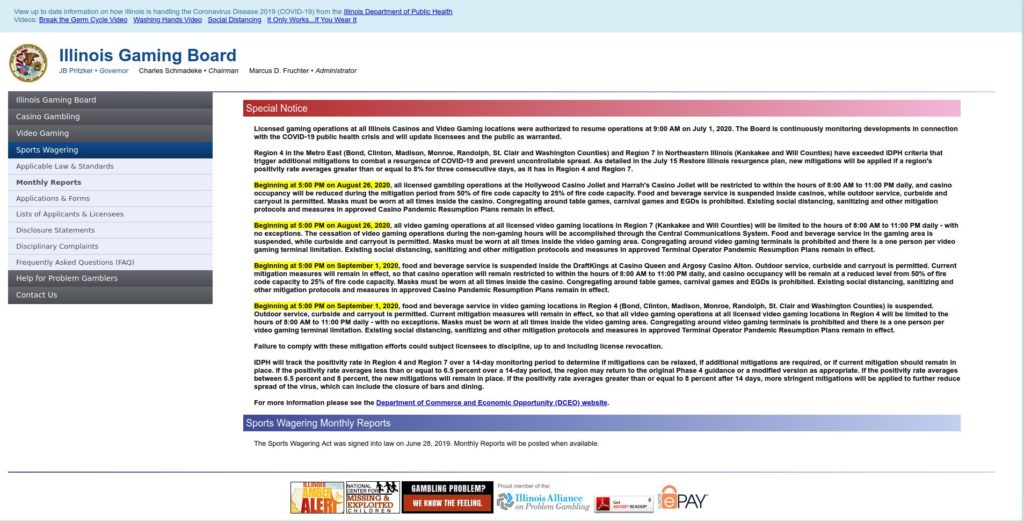
- Illinois should be a great sports betting market but high taxes and fees are limiting competition.
- With an absurd licensing fee of $10 million only a few companies have shown interest in Illinois.
- FanDuel becomes the third wagering app available in Illinois.
FanDuel has debuted their mobile app in Illinois as part of their partnership with Boyd Gaming. Boyd owns the Par-A-Dice Hotel Casino in East Peoria, Illinois and eventually FanDuel will open a retail sportsbook at the property. The app went live on August 31 and–for the time being at least–bettors can register remotely. Typically, the state has an in-person registration requirement though it has been suspended temporarily due to the COVID-19 pandemic.
Boyd and FanDuel have a successful partnership that began in 2018. It now includes sportsbetting operations in Illinois, Indiana, Colorado, New Jersey, Pennsylvania and West Virginia. Keith Smith, president and chief executive of Boyd Gaming, thinks the combination will once again be a winner in Illinois:
“Given the tremendous success of our existing FanDuel Sportsbooks, we are confident that the FanDuel Par-A-Dice Sportsbook will quickly become Illinois sports bettors’ mobile app of choice. We are excited for the opportunity to offer both mobile and retail sports betting in one of the most populous states in the country, as we continue to expand our strategic partnership with FanDuel Group.”
Mike Raffensperger, CMO of FanDuel Group, is happy to be in Illinois:
“Sports are back and FanDuel, America’s No. 1 sportsbook, is coming to Illinois with our friends at Boyd Gaming and the Par-A-Dice Casino. Boyd Gaming and the Par-A-Dice are perfect partners for us to bring our innovative sports-betting app and retail sportsbook experience to sports fans in Illinois.”
ILLINOIS SPORTS BETTING A CORRUPT BUREAUCRATIC MAELSTROM
FanDuel becomes only the third mobile app available in Illinois joining BetRivers and DraftKings. They should do great in Illinois–a state that has gone out of their way to limit competition and has chosen to soak the few companies that do operate their rather than creating a viable industry.
As the fifth most populace state in the country and with a great fanbase for Chicago teams Illinois *should* be one of the best sports betting markets in the country. Of course you can forget about that given the state’s history of corruption and intractable bureaucracy. On February 20, it was a major news story that for the first time 4,488 days there were no former Illinois governors serving time in Federal prison. The Illinois gaming industry is just what you’d expect from a state government that has repeatedly been called a ‘dysfunctional mess’. A frequent topic of conversation in the financial and political media is whether or not Illinois will be the ‘first state to go bankrupt’ since it is ‘the poster child for a dysfunctional state fiscal policy’.
So what does Illinois do now that the US Supreme Court has dropped a highly lucrative trillion dollar worldwide business in their lap? Did they make like Colorado and leverage sports betting to bring in revenue, jobs, tourism with more on the way? Guess again. While Colorado might have the most competent and effective gaming commission in the country, Illinois’ might be the most bumbling non-lottery gaming oversight body in the US. We’re well into the 21st Century now and a department of government in a major state shouldn’t have a website that looks like it belongs on Geocities circa 1996. Think I’m kidding?

No doubt some politically well connected individual’s ‘family member’ got paid millions to design this eyesore.
HOW *NOT* TO CREATE A FRAMEWORK FOR A SUCCESSFUL SPORTS BETTING INDUSTRY
Illinois allows retail sportsbooks in casinos and racetracks. There are 10 casino licensees but as of yet only a limited number of sportsbooks serving these. To be fair, the coronavirus pandemic played a part in this. The state’s horrific regulatory framework did the rest. There’s a DraftKings at the Casino Queen in scenic East St. Louis, Illinois–a town that has the dubious distinction of being the ‘murder capital of America’. There are sportsbooks at the Argosy Casino Alton, the Hollywood Joliet Casino and the Hollywood Aurora Casino. These are all Penn National owned properties meaning they’ll probably be rebranded under the Barstool Sports name at some point. The Rivers Casino in Des Plaines has–surprise, surprise–a BetRivers sportsbook. There’s also a William Hill Sportsbook at the Grand Victoria Casino.
License fees are $10 million for a casino owner but one of three mobile only licenses will cost $20 million. I’m serious. This gives Illinois claim on having the most usurious licensing fees in the country. Compare that to Nevada’s $750 licensing fee, Iowa’s $45,000 fee and New Jersey’s $100,000 fee. But what do these states know about having a successful gaming industry? The tax rate is 15% which sadly is nowhere near the worst in the country but significantly higher than the previously mentioned states (Nevada and Iowa have a 6.75% tax rate while New Jersey is 8.50%).
Other than a few deep pocketed players there hasn’t been a mad rush to set up shop in Illinois. Whenever the COVID-19 pandemic abates somewhat players will once again have to go to the casino to sign up (enjoy that trip to East St. Louis to sign up at DraftKings). You can learn more about East St. Louis on the ‘Urban Hell’ Reddit group. Of course you can’t bet on in-state college teams because that’s precisely what in-state players *want* to bet on and the state of Illinois prohibits it for…uh….reasons.
But enough of my speculation….let’s look at the revenue reports and crunch some numbers. In July, 2020 Nevada sportsbooks took $163.6 million in bets. New Jersey–which has a notoriously convoluted accounting system–took $315 million in wagers. In their third month of operation Colorado had a handle of $59.1 million. And Illinois? No clue. The first retail sportsbooks in Illinois–BetRivers and Penn National–launched in early March. All the Illinois Gaming Board website tells us is that monthly revenue reports ‘will be posted when available’.

The sportsbooks that *are* operating in Illinois will likely do just fine. They’re in a highly populated market with minimal competition. The state will likely lose money on sports betting somehow despite the insanely high licensing fees because…well, that’s just the way things are done in Illinois.









